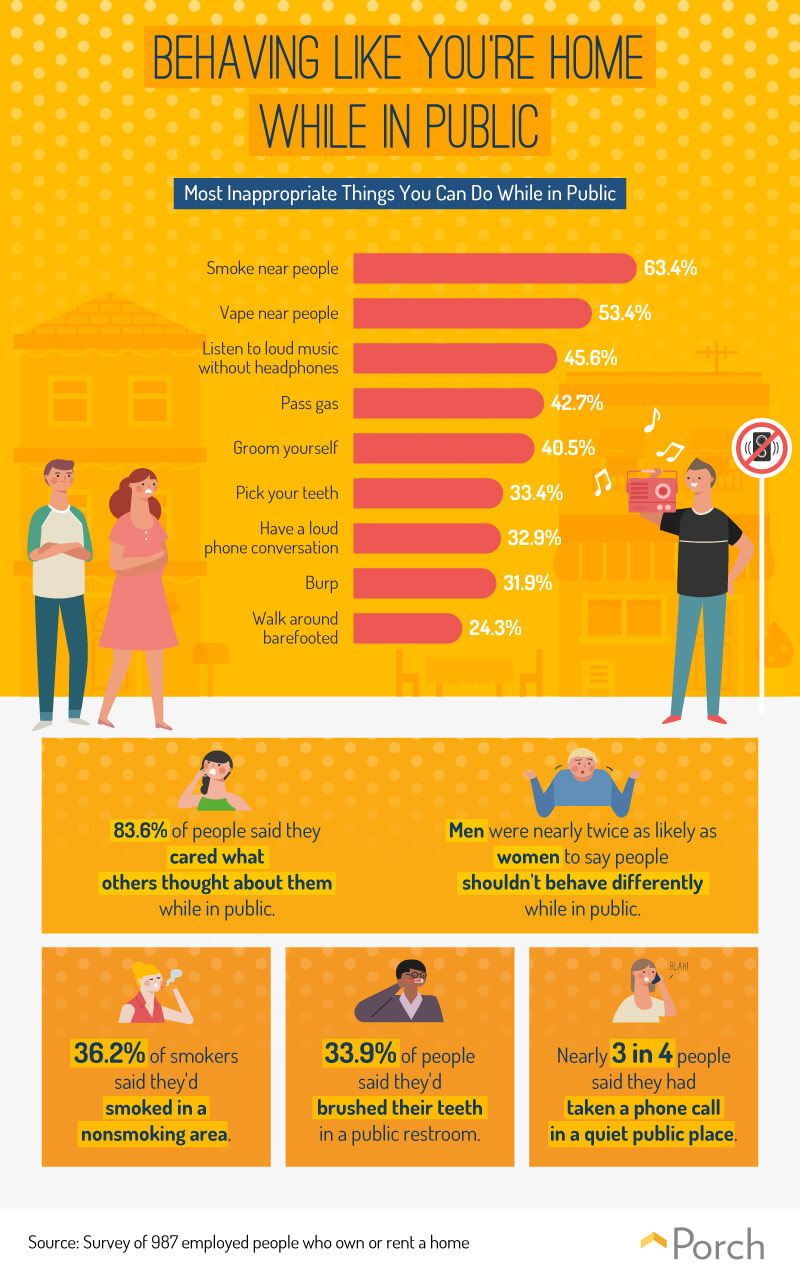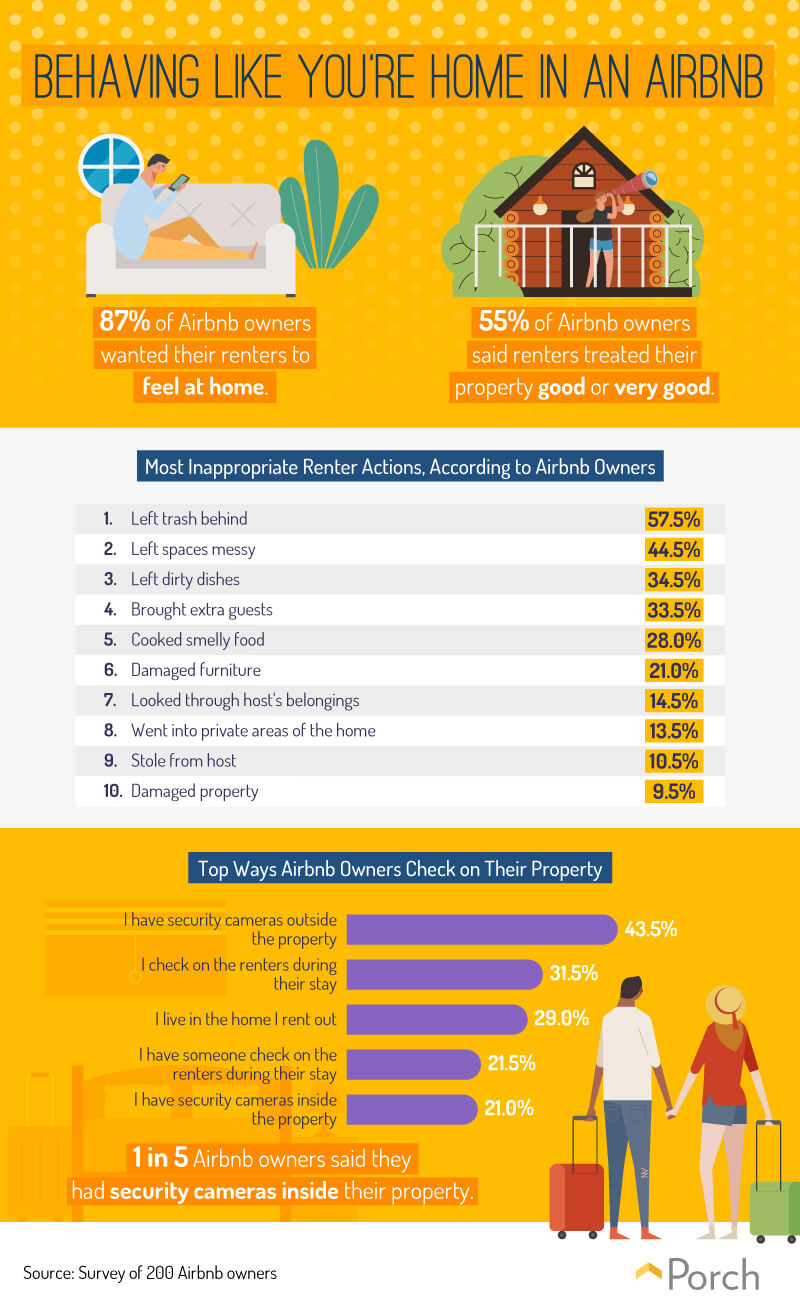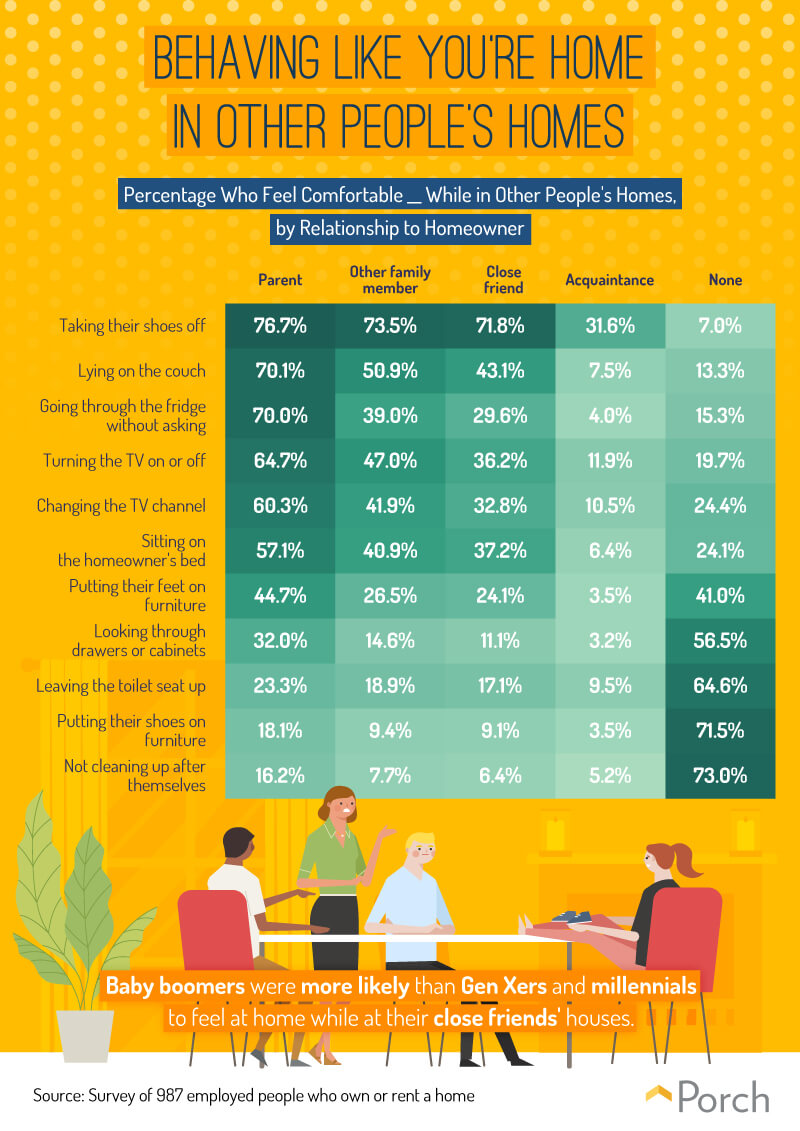Lean back, slip off your shoes, and kick up your feet—but wait, are you home? There may be some things you can do inside your own home that are wildly inappropriate once you’ve stepped over that threshold. While most people leave their shoes at the door, going barefoot elsewhere—like on an airplane—will likely lead to stares, disgust, and perhaps even a viral video.However, sometimes it’s difficult to know where the line is drawn. Is it acceptable to take your shoes off, lie on the couch, and even leave the toilet seat up at a friend’s house? What about an Airbnb or vrbo? We surveyed over 980 people to gauge where people are the most comfortable acting like they’re home and which behaviors are off-limits regardless of location. Before you get too comfortable, keep reading to see what’s acceptable.
Acting out in public
 What you do inside the comfort of your home is, ultimately, your business: You can smoke, play music, or chat on the phone at your leisure. But the second you step outside, smoke-free environments, “shirt and shoes” requirements, and various other rules dictate etiquette. Of all the possible activities, smoking near other people was the most frowned on. In fact, 63.4 percent of people said smoking was the most inappropriate thing a person could do while in public, while 53.4 percent said the same about vaping.
What you do inside the comfort of your home is, ultimately, your business: You can smoke, play music, or chat on the phone at your leisure. But the second you step outside, smoke-free environments, “shirt and shoes” requirements, and various other rules dictate etiquette. Of all the possible activities, smoking near other people was the most frowned on. In fact, 63.4 percent of people said smoking was the most inappropriate thing a person could do while in public, while 53.4 percent said the same about vaping.
When it comes to smoking and vaping, however, it isn’t just perceived as rude; it’s also a major health hazard that has led to numerous policies prohibiting the act. While people are prohibited from smoking in the majority of public places, 36.2 percent of smokers said they’d smoked in a nonsmoking area before.
Going against the grain wasn’t all that abnormal, though. Despite 83.6 percent of people caring what others thought about them while in public, a surprising number admitted to doing things others perceived as inappropriate. Over 40 percent of people said personal grooming was not suitable for public spaces, but 33.9 percent said they had brushed their teeth in a public restroom. Along the same lines, 32.9 percent of people perceived loud phone conversations as inappropriate, yet nearly 3 in 4 admitted to taking a phone call in a quiet public space. Behaving despite society’s rules likely stems from the thought of just being yourself, both in and out of the home—a sentiment that men were nearly twice as likely to believe than women.
Workplace etiquette
 The average employee spends a shocking 90,000 hours at work. And while this may constitute the office as a “home away from home,” there are some things you just shouldn’t do in the workplace. Having loud phone conversations, listening to music or videos without headphones, and taking off shoes were among the most inappropriate things you could do both in public and at work, but in the office, taking other people’s food from the fridge without asking was the worst offense of all: Nearly 73 percent of people said taking food without permission was inappropriate, while 53 percent said the same about leaving food in the fridge for others to clean out.
The average employee spends a shocking 90,000 hours at work. And while this may constitute the office as a “home away from home,” there are some things you just shouldn’t do in the workplace. Having loud phone conversations, listening to music or videos without headphones, and taking off shoes were among the most inappropriate things you could do both in public and at work, but in the office, taking other people’s food from the fridge without asking was the worst offense of all: Nearly 73 percent of people said taking food without permission was inappropriate, while 53 percent said the same about leaving food in the fridge for others to clean out.
Despite the majority of people across all office layouts finding food theft to be wildly unacceptable, it seems to be a pretty common occurrence, with some companies even letting employees watch security footage to find the culprit. But our respondents took responsibility for other, less inappropriate acts. Among employees working in private offices and cubicles, 45.3 percent and 37.2 percent admitted to taking off their shoes at work, respectively. On the other hand, 32.2 percent of employees working in open floor offices said they were guilty of having loud phone conversations that co-workers could hear.
Home away from home

Walls of a cubicle may make people feel right at home in the office, but renting someone’s house or apartment while on vacation takes that feeling to a whole new level. Treating a hotel room like your home is fine and dandy, considering the staff is there to clean up, but some behaviors might not be acceptable to Airbnb hosts.
While 87 percent of Airbnb hosts said they want renters to feel at home, there are unwritten rules they expect guests to follow. Nearly 58 percent of Airbnb owners said leaving trash behind was the most inconsiderate thing a renter did to their property, while 44.5 percent and 34.5 percent said renters left messy spaces and dirty dishes, respectively.
Acting like you’re at home in an Airbnb doesn’t always stay within the home, though. One in 5 Airbnb owners said they had security cameras inside their property, while 43.5 percent had cameras outside. However, unlike what headlines insinuate, Airbnb owners are required to disclose their surveillance and are well within their means to do so. Considering only 55 percent of owners said renters treated their property good or very good, checking in to make sure renters are acting appropriately—either through security cameras or surprise pop-ins—seems necessary.
Friend and family behaviors

Closer to home, your parents’ or close friends’ houses don’t have a rating system to warn others of your behavior. Fortunately, the majority of people felt comfortable doing nearly everything at their parents’ houses and at least taking their shoes off in other family members’ or close friends’ homes. Compared to just 31.6 percent of people who said they felt comfortable removing their shoes at acquaintances’ homes, 76.7 percent said the same of their parents’ houses, while 73.5 percent and 71.8 percent were comfortable at other family members’ and close friends’ homes, respectively.
Even when dealing with family, though, there were some behaviors that people were not at all OK doing. For one, 41 percent of people said they weren’t comfortable putting their feet on furniture in anyone’s home, and 71.5 percent weren’t comfortable putting their shoes on furniture. On top of keeping their feet on the floor, the majority of respondents were not comfortable looking through drawers or cabinets, leaving the toilet seat up, or leaving a mess behind—all behaviors that can be construed as disrespectful.
Turn a house into a home
Everyone’s house rules are different—while some people remove shoes upon entering, others prefer that your bare feet are not all over their home. Keeping in mind the differences in etiquette expectations and not acting like you’re home in someone else’s house is the best way to stay respectful and avoid a rescinded invitation.
But these rules don’t only apply to friends and family members. Respecting the space you work in and the people you work with means keeping your phone conversations to a minimum and your lunch-stealing hands to yourself. Even in homes that you’re paying to stay at, Airbnb hosts expect their property to be respected and for guests to clean up after themselves—but don’t forget, many of them are watching.
There’s no better feeling than feeling right at home, but there’s also no better place to make a home than your own. Whether it’s minor fix-ups, entire renovations, or a move to a new neighborhood, Porch is your pro. With over 1,100 types of home projects and licensed professionals, we are committed to making sure you’re happy with every job and that your house truly feels like a home. To learn more, visit us online today.
Methodology and limitations
To collect the data shown above, we conducted a survey of 987 respondents. To qualify for this survey, respondents were required to own or rent their home and be employed. Of the 987 respondents, 200 owned an Airbnb property. The respondent pool was 57.1 percent female, 42.7 percent male, and less than 1 percent who chose a different option. 317 were baby boomers, born between 1946 and 1964; 330 were Gen Xers, born between 1965 and 1980; and 340 were millennials, born between 1981 and 1997. Because the survey relies on self-reporting, issues such as telescoping and exaggeration can influence responses. An attention-check question was included in the survey to make sure respondents did not randomly answer.
Fair use statement
Do you know someone who is overly comfortable in public places or at other people’s homes? They may like to know which behaviors cross the line. The graphics and content found here are available for noncommercial reuse. Just don’t forget to link back to this page so that readers get all the information and contributors receive proper credit.

